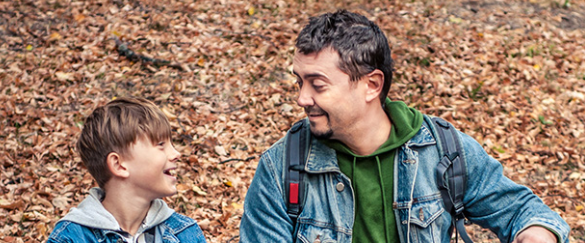Parent Partnerships

The art of good conversation with young people
by Lucy Snowball
Conversations can be challenging with every age group, young and old, and for so many different reasons. With children and teens, just getting the conversation going can be the biggest challenge. How many times have you said, “How was your day?” only to be told “Good” or asked them what they did today only to be told “Not much”! So where to start?
8 tips for turning chit-chat in to richer conversation
- Don’t wait for young people to ask questions or reach out. Raise discussions yourself.
- Be open about your own experiences. In doing so, children are more likely to be open and honest.
- Choose your timing – preferably when you are naturally together anyway in a relaxed setting, rather than setting up a stressful, anxiety provoking meeting. Side by side chats work well (e.g. while driving, walking, doing an activity together like a chore or jigsaw).
- Be calm, prepared and genuinely ready to give your time and attention.
- Listen in a non-judgmental and curious way. Ask, don’t assume! Remember that this is a chance for the speaker to talk through their feelings, not for you to fix their problems.
- Acknowledge and validate their feelings. Don’t minimize their concerns or fears. Whilst they may seem trivial to you, they are real for your child and part of their current experience. Try to understand the importance of what is going on, and the impact for them. Reassure them that whatever they are feeling is okay.
- Leading relationship research tells us that ‘understanding must precede advice’. Premature problem solving tends to shut people down. Solution finding should only begin once you feel you understand what your teen is going through, and your teen feels understood.
- Remember that you do not need to have all of the answers. Ask young people questions like ‘what do you need?’, ‘what do you think would help?’, ‘how can I support you better?’, ‘what would make this easier for you?’. Then together you can come up with an action plan.
How to be a good listener
Great conversation requires great listening. Listening well reduces misunderstanding, eliminates conflict and allows us to understand the other person’s perspective.
Listening is the key to empathy.
- Feeling heard is very validating for young people and it helps to increase their self-esteem, confidence and independence. It also improves relationships and communication skills. So how can we do it well with young people of all ages?
- Be present, make eye contact and remove distractions – don’t be half in half out.
- Listen with the opportunity to learn, not respond.
- Play the same role for your child as a trampoline does – to bounce ideas off, amplify, energise and clarify, provide support.
- Be comfortable in silence – you don’t need to respond immediately; holding space and silence for someone; share insights.
- Have a beige face – neutral, not reacting, remain calm and listen.
- Remain curious throughout.
Becoming an active listener to further improve conversation
Active listening has 3 steps.
Hearing
What did you think you were told?
Understanding
What does this mean to you?
Assessing
Does the statement make sense to you?
Active listening includes:
- Non-verbal responses – eye contact, nodding, posture
- Encouragers – mmm, yes, right, okay, uh-huh
- Reflection of content and feelings – stating back events or emotions
- Matching young people’s language/terms – when appropriate
- Summarising – brief replay of what was said
- Noticing what is missing – gaps, conflicting information, hidden meanings
Finally, here are some effective responses to keep the conversation going while listening actively
- Could you tell me more about that?
- What happened next?
- That must have hurt/felt ….
- How have you handled things like this before?
- I can see this is really troubling you.
- You feel (emotion) because of (situation)?
- Could you repeat that? I want to really understand.
- I like how you said ……
- What options might we have in this situation?
Good conversation with young people comes down to time – creating the time and space and then using that time wisely, perhaps by using the tips above. The art of good conversation teaches us all to build great communication skills, skills that improve our quality of life enabling us to express ourselves clearly and confidently through every aspect of our life.


